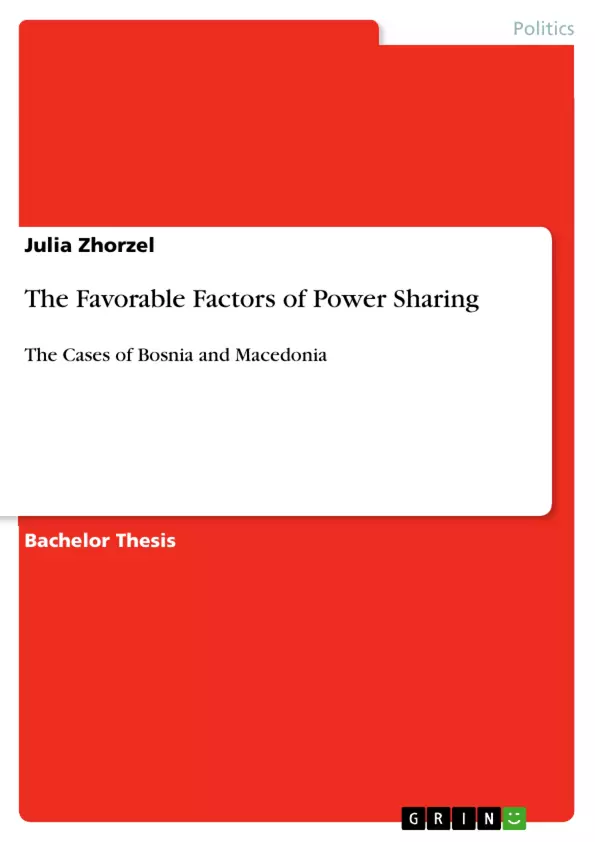Ultimately, the question “Which factors have been favoring and obstructing power sharing in Bosnia and Macedonia?” will be answered in this thesis. The first part will offer the theoretical framework following Arend Lijphart's Favorable Conditions for Consociational Democracy, which has been subject of constant readjustment over the course of his different studies on consociationalism. Following a brief introduction on the theory of consociationalism, the nine favorable factors of power sharing by Lijphart will be explained in greater detail. External actors will be added as an additional factor up for review. Criticism of Lijphart's factors will conclude the first part of the thesis.
The main part of the thesis is concerned with the actual case studies of Bosnia and Macedonia. The theoretical model will be applied to the countries realities, by dedicating a chapter to each factor. Each chapter will end with a short conclusion on whether the factor can be considered favorable in the respective countries, while also including a brief comparison between Bosnia and Macedonia.
Moreover, the conclusion will draw a comparison of the effects of the favorable factors in Bosnia and Macedonia and therefore help assessing the relevance of Lijphart’s favorable factors in general.
Inhaltsverzeichnis (Table of Contents)
- Introduction
- The favorable factors for power sharing
- Smallness
- The composition of segments
- Absence of a solid majority
- Small number of segments
- Segments of roughly equal size
- Geographical concentration of segments
- Socioeconomic differences
- Tradition of elite accommodation
- Overarching Loyalties
- External threats
- External actors
- Criticism
- The concept of favorable factors applied to Bosnia and Macedonia
- Smallness
- The composition of segments
- Absence of a solid majority
- Small number of segments
- Segments of roughly equal size
- Geographical concentration of segments
- Socioeconomic differences
- Tradition of elite accommodation
- Overarching loyalties
- External threats
- External actors
- Conclusion
Zielsetzung und Themenschwerpunkte (Objectives and Key Themes)
This study aims to examine the factors that favor and obstruct power sharing in Bosnia and Herzegovina and Macedonia, two countries with power sharing structures implemented after violent conflicts. The research will focus on the application of Arend Lijphart's Favorable Conditions for Consociational Democracy, providing a comparative analysis of these factors in the context of both countries.
- The impact of favorable conditions for power sharing as outlined by Arend Lijphart
- The specific application of these conditions in Bosnia and Macedonia
- The challenges and opportunities associated with power sharing in post-conflict societies
- The role of external actors in facilitating and maintaining power sharing arrangements
- The effectiveness of consociational democracy in achieving stability and democratic consolidation
Zusammenfassung der Kapitel (Chapter Summaries)
- Introduction: This chapter provides an overview of the current state of affairs in Bosnia and Macedonia, highlighting the continuing challenges to democratization in both countries. It also sets out the rationale for a comparative study of the favorable factors for power sharing.
- The favorable factors for power sharing: This chapter outlines Arend Lijphart's framework of favorable factors for consociational democracy, explaining each factor in detail. It also includes a critical analysis of Lijphart's approach.
- The concept of favorable factors applied to Bosnia and Macedonia: This chapter examines the application of Lijphart's framework to Bosnia and Macedonia, focusing on the influence of smallness, the composition of segments, socioeconomic differences, tradition of elite accommodation, overarching loyalties, external threats, and external actors. Each section includes a brief comparison between the two countries.
Schlüsselwörter (Keywords)
This study examines the concept of power sharing, particularly focusing on consociational democracy, as theorized by Arend Lijphart. It delves into the nine favorable conditions outlined by Lijphart, applying them to the specific cases of Bosnia and Macedonia, both of which are post-conflict societies with power sharing arrangements. Key themes include post-conflict transition, democratization, ethnic relations, and the role of external actors in the implementation and maintenance of power sharing agreements.
- Arbeit zitieren
- Julia Zhorzel (Autor:in), 2015, The Favorable Factors of Power Sharing, München, GRIN Verlag, https://www.hausarbeiten.de/document/311969


